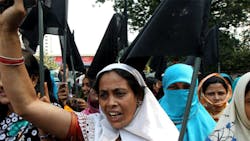Bangladesh Garment Factories Reopen after Days of Protests
DHAKA -- Most Bangladesh garment factories reopened Thursday after five days of violent protests, following a promise of a wage rise for workers and a warning of a tougher crackdown on unrest.
Thousands of textile workers turned up for their shifts as a union leader said they were now "convinced" the government would raise wages for the country's three million garment workers by November.
The Bangladesh Garment and Industrial Workers Federation said assurances were received following several meetings with factory owners and the government, after days of protests to press for a near-tripling of their minimum monthly wage to $100.
"The workers are now convinced that their salaries will be raised by November," said the head of the federation Babul Akter.
The government warned late Wednesday of a crackdown "with all force" against the protests, which started on Saturday and forced the closure of hundreds of factories, where workers toil for long hours to make cheap clothes for Western retailers.
Tens of thousands of workers blocked roads, set factories alight and clashed with police, who responded with rubber bullets and tear gas.
Manufacturers and police said only about 20 factories were shut on Thursday, and most of the country's 4,500 factories were back in production as paramilitary officers were deployed at flashpoints.
"Most of our factories have reopened and the workers have returned to work. It seems the deployment of border guards has worked," said Reaz-Bin-Mahmood, vice president of the Bangladesh Garment Manufacturers and Exporters Association.
Protests over poor wages, benefits and working conditions are frequent in Bangladesh but have gained in intensity since April when a factory complex collapsed, killing more than 1,100 people in one of the world's worst industrial disasters.
Home Minister Muhiuddin Khan Alamgir warned of a crackdown after meeting manufacturers and unions, amid concerns about the impact of the protests on the sector -- the world's second largest after China.
"Garment (making) is a national industry," Alamgir said.
"Those going against this industry will be considered as anti-national," he said, adding that anyone "trying to create unrest in the sector will be contained with all force".
Despite the warning small-scale protests by thousands of workers flared in the industrial areas of Fatullah and Gazipur outside the capital on Thursday. At least 20 police suffered minor injuries in Fatullah where about 2,000 workers attacked officers with rocks and stones. Police fired rubber bullets and tear gas, Inspector Moinur Rahman said. The situation is now peaceful," he said.
Mahmood told AFP that production in "at least 500 garment factories" had been hit by the five-day long protests, costing owners some $40 million.
The protests were triggered by an announcement from manufacturers that they would raise wages by only 20% to 3,600 taka, less than half the amount demanded by unions.
The government said wages would be raised by November, a month earlier than the previous deadline, but the exact figures are still unclear.
Manufacturers say a major increase would erode Bangladesh's advantage as a cheap source of labor, with wages below other major garment-making nations such as India, China and Vietnam.
Copyright Agence France-Presse, 2013
About the Author
Agence France-Presse
Copyright Agence France-Presse, 2002-2025. AFP text, photos, graphics and logos shall not be reproduced, published, broadcast, rewritten for broadcast or publication or redistributed directly or indirectly in any medium. AFP shall not be held liable for any delays, inaccuracies, errors or omissions in any AFP content, or for any actions taken in consequence.
